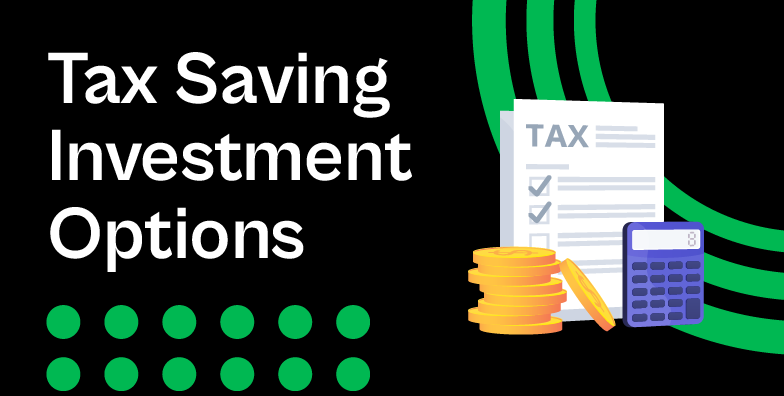Tax saving options
"Tax-Efficient Investing and Wealth Growth through Section 80C
It's crucial to prioritize tax-efficient investing whenever possible to enhance returns by minimizing tax burdens. Section 80C offers a range of investment options that not only help save on taxes but also foster wealth growth.
Understanding these investment avenues is essential to avoid excessive annual tax expenses. When investing, it's imperative to select products based on financial goals and risk tolerance, and consulting a financial expert can provide valuable guidance.
Tax-Saving Options for Wealth Growth under Section 80C

The most common tax-saving options within Section 80C are outlined below:
- ELSS Mutual Funds (ELSS):
- ELSS, or Equity Linked Saving Schemes, are open-ended equity-linked mutual funds that not only offer tax savings under Section 80C but also facilitate wealth growth by investing in equities or stocks.
- Advantages of ELSS include higher long-term returns compared to traditional investments like fixed deposits, a short lock-in period of just 3 years, and completely tax-free income.
- Public Provident Fund (PPF):
- PPF is another effective tax-saving option under Section 80C.
- Key features include tax-free interest on PPF investments, a 15-year lock-in period (extendable in 5-year increments), and limited withdrawal flexibility after 5 years.
- 5-year Bank Fixed Deposits:
- Similar to regular FDs but with a 5-year lock-in period, these offer higher interest rates, albeit with no withdrawal options during the lock-in period and fully taxable annual interest.
- National Savings Certificate (NSC):
- NSC investments made through local post offices offer tax benefits up to Rs. 1,50,000.
- The interest rate varies with the lock-in period, and interest earned is fully taxable. Excess interest, post reinvestment, is also taxable.
- National Pension System (NPS):
- NPS, operated by the Indian Government, provides tax benefits and serves as a post-retirement income source, offering Tier-1 and Tier-2 account options.
- Pension Funds:
- The Deferred Annuity Plan allows annual investments until retirement. Afterward, up to 40% of the accumulated amount can be withdrawn tax-free, with the rest reinvested for a monthly pension.
Additionally, Section 80C includes predefined eligible expenses such as EPF (Employee’s Provident Fund), life insurance premiums, children’s tuition fees, and home loan principal repayments that can aid in tax savings.
Smart Tips for Legal Income Tax Savings through Gift Tax Planning
Utilize these strategies for tax exemptions:
- Invest in the name of parents to enjoy tax-free income. By dividing a substantial investment between both parents (below the senior citizen limit of Rs 3 lakhs), their income remains tax-free.
- Gifts to unemployed siblings allow the original and subsequent interest on the gift to be considered the sibling's income, avoiding tax implications for the giver.
- Cash or assets gifted to a spouse are exempt from gift tax, but any income generated from the gift, like interest or rent, is taxable in the spouse's hands.
- Gifts or interest-free loans to adult children (above 18 years) who earn less income can result in tax liability for them, rather than the giver.
Tax-Saving Strategies for Property Transactions
When buying property:
- Deductions under Section 80C are available for property purchased with a loan.
- Self-occupied properties qualify for a Rs. 2 lakh deduction under Section 24(b) of the Income Tax Act for home loan interest. For non-self-occupied properties, the entire interest amount is deductible.
When selling property:
- Profits from property sales within three years are subject to short-term capital gains tax based on the individual's income tax slab.
- Properties held for over three years attract long-term capital gains tax at a rate of 20% after adjusting for inflation.
- Reinvesting the proceeds equivalent to long-term capital gains in a new Indian property within specified timeframes can save the entire tax liability.
Why Start Tax Planning Early?
Starting tax planning early is crucial for a secure financial future. Late tax planning can have adverse consequences, making timely tax planning the key to financial security.
Tax Efficiency Tips for Freelancers, the Self-Employed, and Small Businesses
For those in these categories, maximizing deductions is essential:
- Operational Expenses: Claim all business-related expenses, including rent, repairs, office supplies, telephone and internet bills, travel, and entertainment expenses directly linked to the business.
- Depreciating Assets: Capital expenditures, such as furniture and equipment, can be depreciated annually according to the prescribed rates outlined in the Income Tax Act.
In conclusion, wise tax planning, early start, and knowledge of available tax-saving options can lead to both tax savings and wealth growth, benefiting individuals across various income groups."
